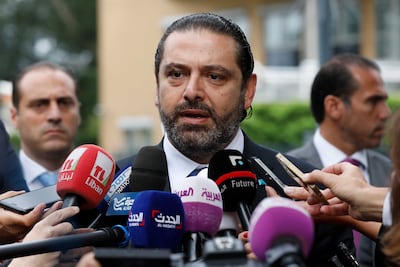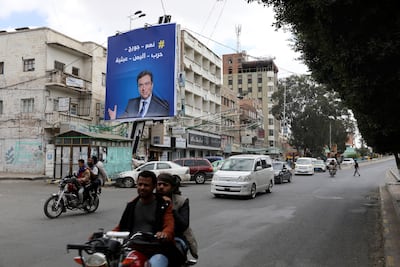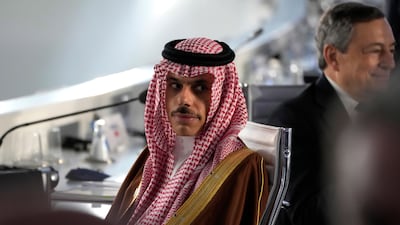Saudi Arabia will not engage with Lebanon's current government for the foreseeable future, the kingdom's foreign minister said on Sunday.
The two countries have been embroiled in a diplomatic spat for a week after Lebanese Information Minister George Kordahi voiced support for the Iran-backed Houthi rebels in Yemen, angering Gulf nations that back Yemen’s internationally recognised government.
The diplomatic row has exacerbated tension between Lebanon’s Iran-aligned government and Saudi Arabia, as Beirut enters its third year of economic and political crisis.
“We have come to the conclusion that dealing with Lebanon and its current government is not productive and not helpful,” Prince Faisal bin Farhan told CNBC. Continued engagement, he said, was “not really in our interest".
Riyadh, he said, took this decision because of Iran-backed Hezbollah's dominance of political life in Beirut and the reluctance of Lebanese leaders to enact reforms necessary to unlock billions of dollars in loans and debt relief after two years of economic meltdown.
The diplomatic row goes beyond the words of TV-star-turned-minister Mr Kordahi, Prince Faisal said.
“For us it’s broader than the comments of one minister – it's an indication of the state that Lebanon is in,” he said, referring to Hezbollah’s influence over Beirut.
“The political scene in Lebanon continues to be dominated by a terrorist group that arms, supplies and trains the Houthi militia.”

The US, most of Europe and the Arab League consider Hezbollah a terrorist organisation.
The kingdom on Friday recalled its ambassador to Lebanon, requested Lebanon’s representative in Riyadh to leave and banned all imports from the country.
The UAE, Bahrain and Kuwait also recalled their diplomats from Beirut.
Oman on Saturday expressed "deep regret" about strained relations between Lebanon and Saudi Arabia and called for dialogue. Its Foreign Ministry urged all sides to "exercise restraint and work to avoid escalation and address differences through dialogue and understanding".
Lebanese Prime Minister Najib Mikati and President Michel Aoun have both distanced themselves from Mr Kordahi’s comments, but stopped short from asking him to resign.
Other Lebanese leaders and religious figures who are not aligned with Iran have asked for Mr Kordahi to step down.

Former prime minister Saad Hariri said on Saturday that Mr Kordahi's words led Beirut towards “unprecedented isolation from Arab countries”.
But Mr Kordahi has so far refused to apologise or resign after Hezbollah expressed support for him, further exacerbating tension with the kingdom.
The minister on Sunday reiterated his intent to remain in his post, telling Lebanese broadcaster Al Jadeed that "resigning from government is not an option for me".
The Houthis also expressed support for Mr Kordahi, with their spokesperson sharing images of the Lebanese minister that have been apparently raised in the capital Sanaa.

In his Sunday sermon, Maronite Patriarch Bechara Boutros Al Rai, the spiritual leader of Lebanon’s largest Christian sect, called on the government to take urgent action.
He called on Mr Aoun and Mr Mikati to take “decisive steps” to defuse the Gulf crisis.
Mr Al Rai met Mr Kordahi on Saturday, but the minister did not make any statement after their consultations.
In May, Charbel Wehbe stepped down as foreign minister after comments deemed insulting by the kingdom when appeared to blame Gulf nations for the rise of extremist groups.


